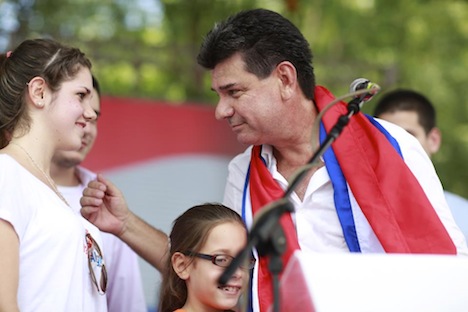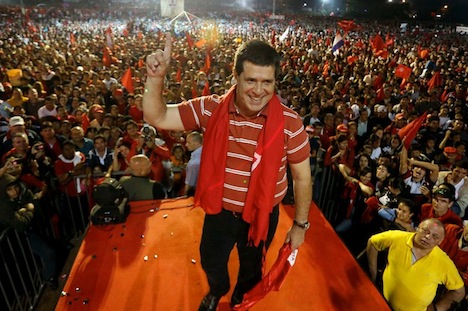When Fernando Lugo took office five years ago, it was with fanfare that Paraguay would have its first leftist president in decades — no one expected Lugo’s term to end without Lugo himself and with the once-disgraced Colorado Party set to return to power. ![]()
Instead, his vice president Federico Franco (pictured above) took over the Paraguayan presidency last June when the Paraguayan Congress overwhelmingly voted to removed Fernando Lugo as president. Franco has pushed through a handful of reforms in the past 10 months — he’s passed the country’s first-ever income tax, and as The Economist noted last autumn, he’s already putting the planned proceeds to use:
Rather than breaking up big farms, he has speeded up the granting of land titles to rural squatters and bought up private holdings to sell on easy terms to those who lack plots. Víctor Rivarola, the social-action minister, says he hopes to double the number of households receiving conditional cash transfers within a year. A law passed in September will dedicate around $40m a year of revenues from the Itaipú dam, which Paraguay shares with Brazil, to promoting information technology in schools. The government is working on a plan to extend nationwide a One Laptop Per Child scheme now run in the town of Caacupé by Paraguay Educates, an NGO.
It’s a decent record, especially given that Franco took office amid international criticism at the speed by which Lugo was unceremoniously dumped from the presidency. Even if the reforms lack the ambition that Lugo brought to the presidency, and even if Lugo has disclaimed his successor’s performance, Franco’s reforms more than bear Lugo’s imprint, and it’s hard to believe Paraguay would have made even that progress without the Lugo revolution.
Franco is not without critics, of course, who attack him for allowing Monsanto and Rio Tinto back into the country, business as usual, despite Lugo’s resistance to global corporations. Lugo himself dismissed Franco’s short-lived transitional administration in an interview with Ed Stocker for Monocle earlier this month:
In Paraguay it’s important to understand where the power is, and Federico Franco doesn’t hold that power. He’s just responding to the interests and initiatives of multinationals and financial capital.
He also worsened already-fraught relations with Venezuela when he immediately called the death of Hugo Chávez a ‘miracle‘, and Mercosur continues to maintain Paraguay’s suspension from its membership, despite the fact that the ‘parliamentary coup’ against Lugo was technically valid under the country’s constitutional and laws.
But as Paraguayans go to the polls today to select a new president, Franco won’t be on the ballot — as the incumbent, even for just a short period, he’s not eligible to run for reelection. That’s a shame, given that his successful election would go a long way, if belatedly, on putting a popular mandate on Lugo’s removal and the past ten months of Paraguayan government.
Given the frontrunners in the election, however, it’s an even bigger shame.
Race to the bottom
Franco leads the center-right Partido Liberal Radical Auténtico (PLRA, the Authentic Liberal Radical Party), which is supporting a Liberal senator, Efraín Alegre (pictured below), for president. Alegre, however, has been damaged recently after allegedly directing the government to buy land from the Parguayan parliamentary speaker, Jorge Oveido Matto, in exchange for the support of presidential candidate Lino Oviedo Sánchez, the nephew of Lino Oviedo Silva, himself a controversial candidate until his death in a helicopter crash in February. Jorge Oviedo Matto resigned his role earlier this week.
Some background is in order. Lino Oviedo (the elder) was the leader of a the Unión Nacional de Ciudadanos Éticos (UNACE, National Union of Ethical Citizens), though like many powerful Paraguayans, his ethics were far from pristine. As chief of the army in 1996, he attempted to oust his boss, then-president Juan Carlos Wasmosy in a coup. Though it failed, and Oviedo himself ended up in prison, he was the popular leader to win the governing Colorado Party nomination for president in 1998. His running mate Raúl Cubas ultimately won the nomination after Oviedo was convicted for his 1996 coup attempt, and Cubas released Oviedo from prison shortly thereafter. The Cubas-Oviedo administration collapsed with the assassination of Luis María Argaña in 1999, and Oviedo fled the country. He returned in 2002 to found the UNACE and won over 22% in the previous 2008 election. That makes the Liberal-UNACE alliance tainted by much more than the express corruption charges.
Meanwhile, the frontrunner for much of the race has been Horacio Cartes (pictured below), a businessman running under the Asociación Nacional Republicana – Partido Colorado (ANR-PC, National Republican Association — Colorado Party). The Colorados were famously in power for 61 years without interruption, 35 of which under the cruel military regime of Alfredo Stroessner (from 1954 to 1989).
Unlike in México, where the Partido Revolucionario Institucional (PRI, Institutional Revolutionary Party) held power for 71 years before a 12-year stint out of power that saw democratic, legal and other institutions take firm root in Mexican governance and politics, there’s no reason to believe that Paraguay or the Colorados have undergone much of a transformation.
Cartes himself carries additional baggage — he’s widely suspected of having deep ties to narco-trafficking, not least because of a leaked 2010 U.S. State Department cable linking Cartes to a U.S. Drug Enforcement Agency action in Paraguay: Continue reading The best candidate for Paraguay’s presidency isn’t on the ballot


